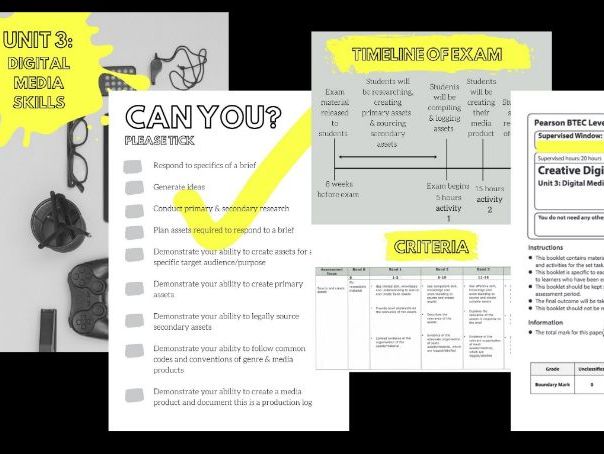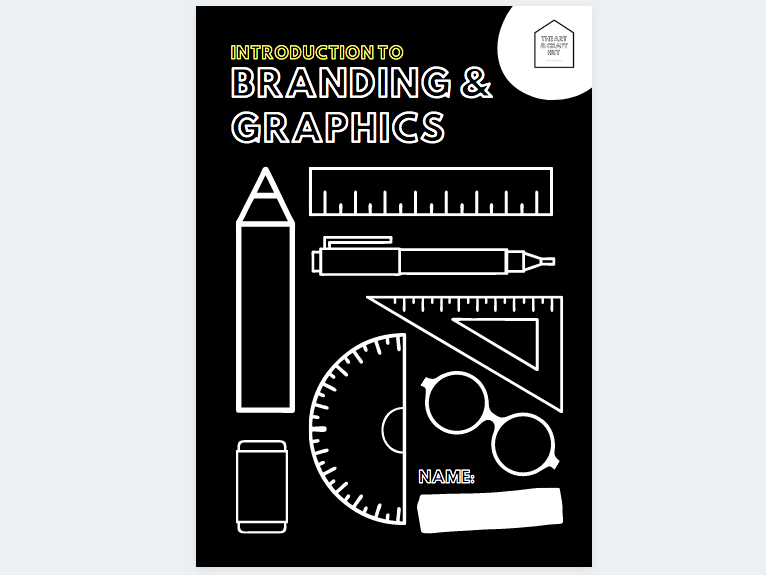139Uploads
61k+Views
99k+Downloads
All resources

LGBT History Month - Informative Booklet
LGBT History Month is an annual month-long observance of lesbian, gay, bisexual and transgender history, and the history of the gay rights and related civil rights movements. It was founded in 1994 by Missouri high-school history teacher Rodney Wilson.
In this booklet students will learn about Marsha P Johnson & Billy Porter, Pansexual Pride, Bisexual Pride, Gay pride, Lesbian Pride, Genderfluid Pride, Trans Pride & Intersex Pride.

CREATIVE ARTS - CLASSROOM DISPLAY - FILM - MEDIA - DESIGN - ART - PHOTOGRAPHY
CREATIVE ARTS - CLASSROOM DISPLAY - FILM - MEDIA - DESIGN - ART - PHOTOGRAPHY
In your portfolio
Elements of design
Composition design
Anatomy of film
Photo composition
Photography basics
The best places to find creative ideas
SWOT Analysis
Design club
What is design thinking?
Why Art?
Types of Art

The Anatomy Of Film - Hand out - Class Display - Printable & Digital
The Anatomy Of Film - Hand out - Class Display - Printable & Digital
Narrative
Cinematography
Mise-en-scene
Editing

Shame, vulnerability, identity, bravery & kindness - Student wellbeing, mental health & reflection
“The definition of vulnerability is uncertainty, risk, and emotional exposure.
But vulnerability is not weakness; it’s our most accurate measure of courage.
When the barrier is our belief about vulnerability, the question becomes:
'Are we willing to show up and be seen when
we can’t control the outcome?” – Brené Brown
RECOGNIZING SHAME
EXPLORING TRIGGERS AND VULNERABILITIES
MY IDEAL IDENTITIES
UNWANTED IDENTITIES
BEING BRAVE
CONNECTING
VULNERABILITY
**All ideas & reflective prompts by Brene Brown

Art & Love - Remote / In School Resource - Valentine's Day - Printable / Digital Booklet
Art & Love: Love through the ages
In this booklet:
Love themes brainstorm (mindmaps)
Love as a subject matter in Art
Amedeo Modigliani: Love in portraits
Rene Magritte: Love & Surrealism
Salvador Dalí: Dali And Gala – The Love Story / Dali inspired “love” landscape collage
Analysing Art with “love” themes

FREE COLOURING SHEETS
FREE COLOURING SHEETS
Fast food
Cute cars
Beautiful butterflies
Our pets
Valentine’s Day
Funny bird

Line Art Worksheet - Remote/In School activity
Learners will demonstrate their mastery of geometric elements by creating an illustration using them! They will use colored markers/pencils/pens to identify them using the coloring key to the right.

Graphic Communication - Brand Personality Adjectives Activity Worksheet - In School/Remote Learning
Graphic Communication - Brand Personality Adjectives Activity Worksheet

My Masterpiece - Planning worksheet for a final project - Artwork planning prompts
My Masterpiece - Planning worksheet for a final project - Artwork planning prompts
I’m going to create…
I’ll be getting my inspiration from…
The elements and principles that I’ll highlight are…
Here’s an initial sketch of my masterpiece…

The Impact of Images - Collaborative photography worksheet - Group photo discussion prompts
The Impact of Images - Photography worksheet - Photo discussion prompts
What was the first thing each of you noticed in the photo?
How does the image make you feel? Why?
What does everyone think the artist is trying to say?

Mental health & student wellbeing activity book - Remote/home or in school reflective activities
Activities to promote good mental health & wellbeing in young people
What is gratitude?
Gratitude is one of many positive emotions.
It’s about focusing on what’s good in our lives and being thankful for the things we have.
Gratitude is pausing to notice and appreciate the things that we often take for granted, like having a place to live, food, clean water, friends, family, even computer access. It’s taking a moment to reflect on how fortunate we are when something good happens — whether it’s a small thing or a big thing.
We can use lots of words to describe feelings of gratitude: We might say we feel thankful, lucky, fortunate, humbled, or blessed.
Why gratitude matters
Gratitude doesn’t just feel good.
Making a habit of gratitude can also be good for us. Like other positive emotions, feeling grateful on a regular basis can have a big effect on our lives. Brain research shows that positive emotions are good for our bodies, minds, and brains.
“Friendship is born at that moment when one person says to another, ‘What! You too? I thought I was the only one.” – C.S. Lewis
Hugs relieve stress & pain
Hugging often creates a feeling of calmness and relaxation. That’s because of oxytocin, which is sometimes called the “cuddle hormone.”
Oxytocin is released when people or pets snuggle up or bond socially. This release can have a domino effect throughout the body and has been found to:
-Reduce inflammation.
-Improve wound healing.
-Lower heart rate and stress.
Goal setting
Goals Can:
-Improve self-image
-Increase awareness of one’s strengths
-Prove an experience of success
-Facilitate effective visualisation
-Encouraging prioritisation
-Define reality and separating it from wishful thinking
-Builds responsibility for one’s self
-Improving decision making
40 yoga moves to try at home

Pearson BTEC Level 3 Nationals- Creative Digital Media Production- Unit 3: Digital Media Skills Exam
This booklet contains learning material for the completion of the preparatory work and activities for the set task for Unit 3: Digital Media Skills exam.
ABOUT UNIT THREE EXAM:
The assessment period lasts eight weeks and comprises:
5 hours for Activity 1 under supervised conditions
15 hours for Activity 2 under supervised conditions.
**The best performing learners clearly used the preparatory period to:
research their chosen theme
develop a good understanding of relevant codes and conventions
explore how the client’s specific requirements have been used in existing media
products
gather a range of assets/material from secondary sources
**Specific marking guidance:
The marking grids have been designed to assess learner work holistically.
Rows within the grids identify the assessment focus/outcome being targeted.
When using a marking grid, the ‘best fit’ approach should be used.
● Examiners should first make a holistic judgement on which band most
closely matches the learner response and place it within that band.
Learners will be placed in the band that best describes their answer.
● The mark awarded within the band will be decided based on the quality
of the answer in response to the assessment focus/outcome and will be
modified according to how securely all bullet points are displayed at that
band.
● Marks will be awarded towards the top or bottom of that band depending
on how they have evidenced each of the descriptor bullet points.
**Formal supervision is the equivalent of examination conditions. Learners must work independently, cannot work with other learners, cannot talk about their work to other learners and will only be able to access the materials specified in the assessment.
**Independent preparation is required in this assessment so that learners are able to source assets for their product. Centres need to make provision for this preparation using scheduled lessons and ensuring that learners have access to information and equipment that may be required. Learners should be working independently rather than being taught
or directed.
**Monitored preparation is provided when learners produce materials that are used in any formally supervised session. This includes notes, artefacts, assets, plans etc. as specified in the sample assessment. Monitored sessions are where learners are being directly observed.
They may have, where specified, access to their own outcomes from preparation, access to the internet and use of appropriate resources.
Learners are working independently and teachers/tutors will be able to authenticate that the outcomes for formal assessment meet
the requirements and are authentic. At the end of the monitored preparation, centres will retain the assets which will be provided to learners during the formal supervised assessment.

Christmas Craft - Christmas felt wreath - FREE XMAS ACTIVITY
Christmas Craft - Christmas felt wreath - FREE XMAS ACTIVITY

2020 Colour-In Christmas Cards | Covid/Coronavirus | XMAS Crafts | Remote Or In School Activity
2020 Colour-In Christmas Cards | Covid/Coronavirus | Christmas Crafts | Christmas Activity

Colour in Christmas Tags | Gift Tags | XMAS Crafts | Remote Or In School Activity
Colour in Christmas Tags | Gift Tags | Christmas Crafts | Christmas Activity
Printable Christmas Gift Tags for Children to Color: No time to craft your own gift tags this year? That’s ok, we did it for you!

7 FREE Christmas Activities Worksheets - Remote/In School Activity
7 FREE Christmas Activities Worksheets
Some include:
Christmas Tree Addition: How many Christmas trees do you see? Add them together, then write the correct answer in the box. A sweet Christmas treat awaits the first 5 groups to get a perfect score.
Christmas Countdown: Santa has scattered plenty of presents in the living room. Count the number of gifts you find, and group them under the “small”, “medium”, and “large” categories! Win a special Christmas gift from Teacher Ann if you get all the answers right.
A Merry Mathematics Game: Answer the equations given below. Once you get the answers, find and color the following numbers in the chart with the indicated color.
Counting Santa’s Gifts: The red gifts are for the kids in Christmas Village, the green gifts are for the kids in Yuletide Village, and the gold gifts are for the kids in Holiday Village. Count how many gifts go to each village. Write them in the boxes below.

60 COLOUR IN CHRISTMAS CARDS BY THE ART & CRAFT HUT - Remote/In School Xmas Craft Activity
60 COLOUR IN CHRISTMAS CARDS BY THE ART & CRAFT HUT

Remembrance Day - Informative Colouring Book
Informative colouring pages to teach children about the importance of Remembrance Day.
What is Remembrance Day?
Remembrance Day is a memorial day observed in Commonwealth member states since the end of the First World War to remember the members of their armed forces who have died in the line of duty.
Traditions
There are some things that people do on Remembrance Day at 11:00 AM. That is when the World War ended. At a ceremony for Remembrance Day, a tune called “The Last Post” is played on a bugle (or sometimes a trumpet). Then there is two minutes of silence. At the end of the silence, the bugle plays a tune called “Reveille”.
In many countries, many people wear a poppy on Remembrance Day, and for a few days before. The remembrance poppy is an artificial flower to commemorate those who died in war. People bring wreaths made of poppies to Remembrance Day ceremonies.
The poppy is a symbol to show they remember the wars, and the soldiers who fought in them. Poppies were chosen as a symbol because they often grew in battlefields after the soldiers stopped fighting.
What is the Shrine of Remembrance?
The Shrine of Remembrance is a war memorial in Melbourne, Victoria, Australia, located in Kings Domain on St Kilda Road. It was built to honour the men and women of Victoria who served in World War I, but now functions as a memorial to all Australians who have served in any war.
Why is Remembrance Day so important?
On Remembrance Day, we acknowledge the courage and sacrifice of those who served their country and acknowledge our responsibility to work for the peace they fought hard to achieve. During times of war, individual acts of heroism occur frequently; only a few are ever recorded and receive official recognition.

The Art & Craft Hut - Relax your mind - FREE calming colouring pages for teachers
The Art & Craft Hut - Relax your mind - FREE calming colouring pages for teachers
Bundle

Introduction To Media: Graphics (Poster Design), Website Production, Photography & Branding
Introduction To Media for Secondary Learners: Graphics (Film Poster & Poster Design), Website Production, Digital Photography & Branding Bundle.
Full year of Media planned for Secondary learners




















